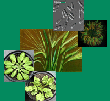Teilprojekt C1 im FK 560 "Lokales Handeln in Afrika im Kontext globaler Einflüsse"
SFB/FK 560
From 07/2003 to 12/2004Principal Investigator: Erwin Beck, Franz Rottland
Staff: Mohamed Pakia
The Digos inhabit the very South of Kenya’s coast. As one of the nine subgroups of the Mijikenda the Digos maintain sacred forests, the so-called Kayas which as remnants of the virgin coastal forests are stell of mythic significance. Kaya forests are considered untouchable and only the Kaya elders are allowed to collect plant material for medicinal purposes. In that way the persistence of Kayas has conserved the herbalist’s profession and in turn the traditional Digo knowledge and views of plant life. Since the Digos were the first Mijikenda subtribe which separated from the whole group, the indigenous Mijikenda knowledge may, at least partly, have been preserved in its original form. On the other hand, modern plant science is taught in the schools, and via consultants has been spread since decades in the farming population. The project aims at a comparison of a possible indigenous Digo system of plant knowledge with modern botany. Herbalists as well as farmers, teachers, pupils and students are being interviewed and the old knowledge and the modes of tackling the traditional and the modern knowledge are extracted from the answers. These interviews are performed as joint field studies of linguists and plant scientists in which not only verbal information is seeked but actions such as plant material collection, plant identification and treatment of patients are observed and discussed as well. Interviews are further used to differentiate between the original Digo plant knowledge and the influence of the Suahelis (Islam) on the understanding of plants and plant life in the Digo tribe. The interviews have shown that plant knowledge of the herbalists and also of farmers is rather punctual and that a general system of looking upon plant life would presumably surmounts the scope of the indigenous people.


